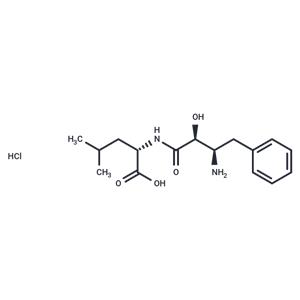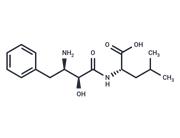| Name | Bestatin hydrochloride |
| Description | Bestatin hydrochloride (Ubenimex hydrochloride) is an inhibitor of aminopeptidase N (APN)/CD13 and aminopeptidase B. |
| Cell Research | Growing cells (1×106 to 2×106 cells/mL) are diluted to 1.0×103 cells/mL and transferred (3 mL) into a well in a 12-well multiwell plate (2.5-cm diameter/well). Cells are treated with 0, 10, 50, 100, 300, or 600 μM Bestatin and allowed to grow at 21°C shaking at 180 rpm for 48 h. A hemocytometer is used to measure cell density after 0, 24, and 48 h. |
| Kinase Assay | Cells are harvested, washed, and lysed in NP-40 lysis buffer (50 mM Tris-HCl [pH 7.5], 150 mM NaCl, 0.5% NP-40). Total cell protein is quantified using the Bradford assay and 1-mg/mL protein aliquots are made. Ten microliters of total cell protein is mixed with 290 μL of substrate solution (0.1 mg/mL dithiothreitol [DTT], 0.1 mg/mL albumin, and 1 mM alanine-β-naphthylamide). Fluorometric measurements (340 nm excitation, 400 nm emission) are made after 15 and 30 min. The slope of the line between the 15- and 30-min measurements is used to represent aminopeptidase activity. Total cell protein is preincubated with bestatin, amastatin, puromycin, EDTA, and/or ZnCl2 for 20 min before the fluorometric aminopeptidase assay. |
| In vitro | Bestatin, also known as Ubenimex (INN), is a competitive protease inhibitor. It is an inhibitor of aminopeptidase B, leukotriene A4 hydrolase, aminopeptidase N. It is being studied for use in the treatment of acute myelocytic leukemia. Bestatin can be administered, with low toxicity, to cultured cells, intact animals and humans. It has become a useful tool in elucidating the physiological role of some mammalian exopeptidases in the regulation of the immune system, in the growth of tumors and their invasion of surrounding tissues, and in the degradation of cellular proteins. |
| In vivo | Bestatin is an active anti-angiogenic agent that may inhibit tumor angiogenesis in vivo and tube-like formation of endothelial cells in vitro through its inhibition of APN/CD13 activity. Oral administration of Bestatin (100-200 mg/kg/day) is found to significantly inhibit the melanoma cell-induced angiogenesis in a mouse dorsal air sac assay. |
| Storage | Powder: -20°C for 3 years | In solvent: -80°C for 1 year | Shipping with blue ice/Shipping at ambient temperature. |
| Solubility Information | DMSO : 237 mg/mL (687.28 mM), Sonication is recommended.
10% DMSO+40% PEG300+5% Tween 80+45% Saline : 5 mg/mL (14.5 mM), Sonication is recommended.
H2O : 20 mg/mL (58 mM), Sonication is recommended.
|
| Keywords | Ubenimex Hydrochloride | Ubenimex | Inhibitor | inhibit | CD13 | Bestatin hydrochloride | Bestatin Hydrochloride | Bestatin | Bacterial | Antibiotic | Aminopeptidase |
| Inhibitors Related | Neomycin sulfate | Dehydroacetic acid sodium | Ampicillin sodium | Methyl anthranilate | Doxycycline (hyclate) | Kanamycin sulfate | Urethane | Sulfamethoxazole sodium | Doxycycline | EDTA copper(II) disodium salt | Isoeugenol | Dimethyl sulfoxide |
| Related Compound Libraries | Bioactive Compound Library | Anti-Cancer Clinical Compound Library | Drug Repurposing Compound Library | Natural Product Library | Inhibitor Library | Anti-Cancer Approved Drug Library | Natural Product Library for HTS | Immunology/Inflammation Compound Library | Anti-infective Natural Product Library | Bioactive Compounds Library Max | Anti-Cancer Active Compound Library | Anti-Cancer Drug Library |

 United States
United States






